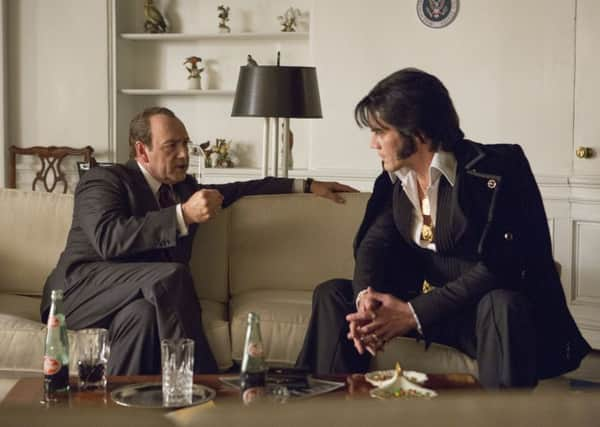Film review: Elvis & Nixon | The Meddler | Adult Life Skills | Remainder


According to Elvis & Nixon, the photograph documenting the 1970 White House meeting between the King of Rock ‘n’ Roll (decked out in full Vegas-era regalia) and the destined-to-be-disgraced president of the United States (looking very much the beady-eyed statesman) is the most requested photograph of all time from the US national archives. But while the incongruity of its existence suggests it might have a good story behind it, this cutesy movie bungles the telling of it.
In lieu of an actual recording of their conversation (Richard Nixon didn’t start his fateful policy of taping his Oval Office meetings until 1971), Liza Johnson’s film (**) patches together what documentation of the meeting does exist into a speculative plot that works every myth about Elvis’s nuttier side into what amounts to an 86-minute skit that outstays its welcome by approximately 83 minutes.
Advertisement
Hide AdThe thrust of the plot is Presley’s determination to be deputised as an undercover FBI agent. He wants to infiltrate the counter-culture to help prevent America sliding further into anarchy and sees the right wing Nixon – whose appeals to America’s “silent majority” helped him win a landslide victory against the Democrats two years previously – as something of a kindred spirit. Elvis’s own obsolescence in the free-love hippy era is the natural subtext here, something that seems to have convinced Michael Shannon to take his performance as Presley far too seriously. Striving for pathos, he drains any fun out a premise that calls on him to shoot up televisions, practice karate and try to smuggle guns into the White House.
As Tricky Dicky, Kevin Spacey has a better grasp of the tone the film should be striking. He nails the coarse, embittered, workhorse demeanour that fuelled Nixon’s paranoia and craving for popularity, and his performance raises a few smiles as the president attempts to curry favour with his daughter by hounding Elvis for an autograph.
But the material Spacey has to work with is frustratingly weak, and the film around him – which is desperately short on jokes, satirical or otherwise – illuminates nothing about the political system.
The Meddler (**) isn’t much better. The recipient of some bafflingly strong reviews when it was released in the US a few months ago, this vehicle for Susan Sarandon is the worst sort of indie movie: the kind that’s really just cheap mainstream filmmaking masquerading as something more substantial. Sarandon plays the meddler of the title, a recently widowed New Yorker who has moved to Los Angeles to be closer to her screenwriter daughter (Rose Byrne).
Bombarding her with constant phone calls and unannounced visits, she soon realises she’s not quite needed in the way that she’d hoped, so starts filling her days in other ways by volunteering at the local hospital, organising (and paying for) a lesbian wedding and helping a young African American man go to night school.
She also gets involved with a retired cop (JK Simmonds) who keeps chickens and has a strained relationship with his own daughter. Along the way subplots are set up and abandoned, while every potentially comic scenario is exploited in the broadest, most groan-worthy way imaginable.
Advertisement
Hide AdDuff movie number three this week is Adult Life Skills (**), an annoyingly twee British quirk fest starring Jodie Whittaker as a grief-stricken woman forced to get a grip on her life as her 30th birthday approaches. Still reeling from the death of her twin brother, Anna (Whittaker) has retreated into a state of arrested development, living in her mother’s garden shed and spending her spare time making pop-culture-referencing internet videos starring her thumbs.
Woven into the narrative, these desperately unfunny interludes make the film seem like a really boring person’s take on Michel Gondry or The Adam & Joe Show. Expanded from writer/director Rachel Tunnard’s Bafta-nominated short, the film itself feels hopelessly stretched. The supporting characters – such as the aspiring author whose chronic shyness around Anna is half-heartedly presented as a form of autism – never feel particularly believable and the therapeutic bond she forms with a lonely young boy also feels very contrived.
Advertisement
Hide AdThe contrivance of art is actually one of the thematic concerns of Remainder (****), an audacious attempt to tell a complex story cinematically without nullifying the integrity of its central conceit. Adapted from Tom McCarthy’s 2005 cult novel by visual artist Omer Fast, the London-set film begins with protagonist Tom (Tom Sturridge) losing his memory in a freak accident. Awaking from a coma with a large settlement at his disposal, he proceeds to use his newly acquired fortune to reconstruct a version of his past from what few fractured memories remain.
What’s fascinating here is Fast’s commitment to keeping us in Tom’s headspace. We’re just as in the dark as Tom as he hires people to re-enact moments he thinks he remembers from his life as part of his obsessive attempt to unlock clues to his identity. Buying a tenement building and spending vast sums set-decorating it, his quest at times resembles the faked authenticity of film production – yet real life impinges in the form of sinister people from his past who seem intent on doing him real harm, something that adds further layers of unpredictability to the movie.
Although Memento and Synecdoche, New York are the obvious points of comparison here, the film isn’t really like either. Fast’s determination to embrace the philosophical ideas at the heart of the story ensures it has an intriguingly weird identity all its own.